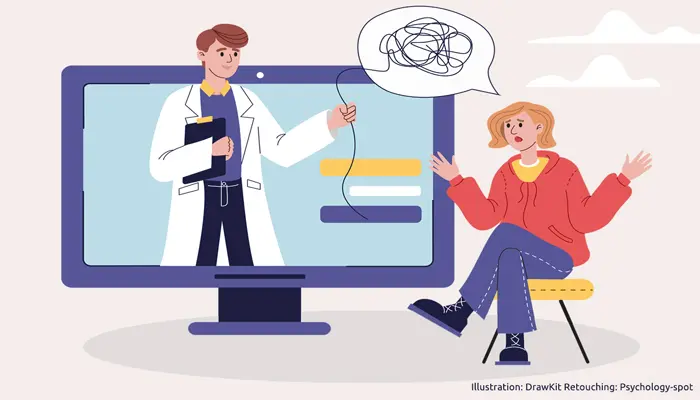
New technologies have broken into all areas of our lives. We can book a plane ticket, make a bank transfer or do a job interview without leaving home, from our mobile or computer.
Also the psychologists are adapting to the new times, so you can receive guidance on an issue that worries you or even follow a psychotherapeutic treatment from home. However, it is important to be clear that, although online therapy is effective and beneficial, it is not valid for all cases. You have to know when to choose an online psychologist and when it is better to choose a face-to-face therapy.
The strengths of online counselling
A survey conducted in the United States with 1,000 people who were receiving online therapy revealed that 93% think it is being effective. 91% also think that more people should try it, a resounding endorsement that shows that online counselling is succeeding.
In fact, the very characteristics of online therapy are contributing to its spread, removing many of the obstacles that prevent people from seeking help:
• Greater comfort
92% of people who turn to an online psychologist consider that it is a more comfortable alternative than face-to-face therapy because it saves time and travel. They don’t have to go to the bathroom, fight traffic or deal with public transportation, sit in a waiting room, ask for time off from work, or find someone to babysit their children. Of course, it also helps that online psychologists have a greater availability of schedules and that there are no geographical barriers.
• More privacy
91% of people who use online therapy feel more comfortable because they speak with the therapist from the privacy and security of their home. This makes them feel more comfortable and less self-conscious, which helps them to open up more. Online therapy allows them to be more vulnerable and express the most difficult emotions, an opening that can speed up the process of emotional healing.
• Lower cost
82% of people also indicate as a positive aspect that online sessions are usually cheaper than face-to-face ones. Although the consultation time is generally the same, the lower infrastructure costs allow most online psychologists to have more competitive rates than face-to-face ones.
• Fast answer
In the past, it was more difficult to access psychologists, especially in moments of crisis, since contact was often limited to a weekly session. However, with the new technologies it is easier to send them a message and receive a quick response to clarify a doubt or solve a problem. Therefore, it is not surprising that 91% of people value the intrinsic speed and connection of online treatments as positive.
• Secure sessions
86% of people value that online therapy is safe. Those who turn to an online psychologist not only want to feel more comfortable at home, but also want to protect their privacy and avoid possible stigma. For this reason, if you are thinking of looking for an online psychologist, it is important that you choose a platform that guarantees absolute privacy through encrypted communication. A platform, for example, that integrates all communication tools within the same account, without the need to resort to third-party platforms such as Skype or Zoom, to provide its clients with greater security and protect their private information.
• Access to quality psychological treatment
90% of people are also satisfied with the quality of the online sessions. In fact, online psychotherapy is basically carried out in the same way as face-to-face therapy, so the quality of the treatment is the same. An investigation carried out at the Jacobs University of Bremen even found that the adherence to the treatment of the online group was greater than that of the one who went to a face-to-face psychologist.
The profile of people who can look for online therapy
In general, anyone can do therapy through the Internet. However, it is more convenient to put yourself in the hands of an online psychologist if:
• You live in a remote place and there are no face-to-face psychologists nearby or specialized professionals who can adequately address your problem.
• You travel often or have busy work schedules, making it difficult for you to attend face-to-face counselling or find available appointments.
• You have difficulty getting around, either because you suffer from a physical disability or a mental disorder that limits your ability to leave home, such as agoraphobia or social phobia.
• You are living in another country and you feel more comfortable speaking in English with a psychologist who shares your same culture and can understand you better.
• You feel more comfortable in the privacy of your home and communicating through digital media or are you afraid that going to a face-to-face psychologist will end up generating a stigma.
• You have a specific problem about which you need psychological guidance or you need help to overcome a specific situation, such as making a complex life decision or the loss of a loved one.
Who should choose face-to-face counselling?
Despite the undeniable benefits of online therapy, it would be a mistake to try to extend this model to all people and mental health problems. After all, no matter how much technology has advanced, sometimes online therapy lacks the closeness that comes from face-to-face encounters.
While video calls can be very effective, when you’re not physically sharing the same space, it can be more difficult to connect emotionally. The online psychologist may even miss some of the person’s body language cues that help him better understand the person’s reactions and emotional state, such as when he fidgets his legs or wrings his hands under the table.
In face-to-face therapy, the therapist also finds it easier to generate the emotional environment that the person needs, transmitting security, tranquility and trust. Therefore, it is easier to comfort, support or contain him, especially in moments of crisis.
For these reasons, it is important that those who suffer from serious mental disorders, such as psychotic or eating disorders, or those who have suicidal thoughts, seek a face-to-face psychologist.
A study carried out at the Alberta Mental Health Board in Edmonton revealed that people with psychiatric disorders can benefit from online therapy, but this modality is mainly used to follow face-to-face therapy. Instead, a meta-analysis conducted at the University of Haifa revealed that online therapy is particularly effective in treating problems such as stress, anxiety and depression.
However, the more serious the problem, the more important it is to choose face-to-face therapy. If you have doubts about the most appropriate modality for you, you can contact an online psychologist, who will be able to tell you what is the best way to address your problem.
Sources:
Lippke, S. et. Al. (2021) Adherence With Online Therapy vs Face-to-Face Therapy and With Online Therapy vs Care as Usual: Secondary Analysis of Two Randomized Controlled Trials. J Med Internet Res; 23(11): e31274.
Spiegel, B. (2020) A Verywell Report: Americans Find Strength in Online Therapy. In: Verywell Mind.
Barak, A. et. Al. (2008) Comprehensive Review and a Meta-Analysis of the Effectiveness of Internet-Based Psychotherapeutic Interventions. Journal of Technology in Human Services; 26(2-4): 109-160.
Urness, D. et. Al. (2006) Client acceptability and quality of life – telepsychiatry compared to in-person consultation. Journal of Telemedicine and Telecare; 12(5): 251-254.



